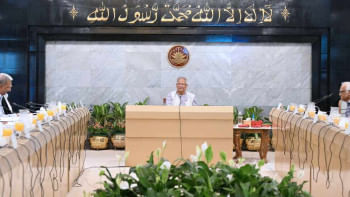Dhaka should back ICC initiatives

The International Criminal Court (ICC) has sought to know Bangladesh's opinion on whether it can exercise its jurisdiction over the deportation of Rohingyas. Taking the significance of the move into consideration, The Daily Star interviewed some experts to know their views on it. Today we are running the interview of M Humayun Kabir, a former foreign secretary of Bangladesh.
Bangladesh should support the ICC initiative as the country is committed to holding accountable anyone accused of carrying out war crimes, and also to create international pressure on Myanmar for a sustainable solution to the Rohingya crisis, said Humayun Kabir.
At the same time, from a realistic point of view, the country needs to be pragmatic given the fact that Myanmar is its second closest neighbour. Bangladesh has to maintain the bilateral relations also for trade and commerce because Myanmar is a gateway to the Southeast Asia and China, he said.
“Therefore, we need to maintain a balance,” Kabir said.
Humayun Kabir, vice president of Bangladesh Enterprise Institute, worked as an ambassador of Bangladesh to the Washington DC, Nepal and as high commissioner to Australia and New Zealand, among his other assignments in the foreign office. Before joining Foreign Service, Kabir taught at the departments of political science, and law at Dhaka University in 1977-1980. His research interests include accountability in governance, foreign policy, South Asian affairs and migration, among others.
Here is the full interview.
DS: How should Bangladesh go about the ICC letter?
Humayun Kabir: Ideally, Bangladesh should support the ICC initiative. We have already proved that we are committed to holding accountable anyone for war crimes or crimes against humanity. We have already tried those who were involved in crimes against humanity through the International Crimes Tribunal. We believe that this practice should continue in any other cases wherever such crimes happen, including in our neighbourhood.
DS: The Bangladesh government is still undecided over the matter though the deadline for submitting the observations to the ICC is June 11. Why is it happening?
Humayun Kabir: While Bangladesh should support the ICC initiative in principle, from practical perspective, we need to be pragmatic. The Rohingya crisis is only one of the problems between Bangladesh and Myanmar, which demands urgent and serious attention for an early, honourable and sustainable solution. There are other facets of bilateral relations. We cannot forget that Myanmar is the second closest neighbour of Bangladesh and we ought to interact with Myanmar under all circumstances today and tomorrow. Nonetheless, there is little scope to underestimate the urgency and moral compulsion of decisively dealing with the crimes committed against the Rohingya population in Myanmar.
DS: You are talking of an ideal situation and then practical perspective. What do you exactly suggest?
Humayun Kabir: If the ICC investigates and frames charges, it [the matter] is likely to land up in the UN Security Council to decide whether it [ICC] can pursue the case or not. Ultimately, the ICC also has to think of the existing reality in the international order. It cannot ignore the relationships among the big powers. Like it or not, these are the realities. Bangladesh has been trying to solve the problem bilaterally with Myanmar. We have been proactive in solving this but it has been stalled because of Myanmar. Therefore, international pressure on Myanmar is imperative. The ICC initiative is a tool to strengthen and intensify international pressure. How far we go with it is a matter of political choice. If we have the political will to pursue this matter through the ICC, we would need to significantly intensify our diplomatic engagement globally, particularly with China and Russia, two permanent members of the United Nations Security Council. Our deep ties with both of them, economic and otherwise, should allow us some leverage with them, which should be capitalised suitably. At the same time, we must also keep in view the fact that it will also have some negative ramifications on our relations with Myanmar at least in the short term.
DS: What's your suggestion in this regard?
Humayun Kabir: If the ICC decides to go further with the Rohingya case, Bangladesh should support it. This should be in line with our moral commitment on this issue. However, the Bangladesh government has to keep in mind that it is a long-term process and it has to have that level of stamina. Pursuing this matter legally with the ICC will have to require Bangladesh actively mobilise the international community to produce desired level of outcome. This also calls for a national unity, strong domestic coordination, investment in diplomacy, and consistency in policy.
DS: Myanmar has not been sincere in addressing the Rohingya crisis, which has been a real bottleneck in improving the economic and trade relations. Do you think Bangladesh can really improve the business relations with Myanmar by going softly on the Rohingya issue?
Humayun Kabir: You are right. As of now, our relationship with Myanmar has been uninspiring despite repeated efforts by Bangladesh to boost the relationship in a multi dimensional manner. Our bilateral trade is still small, connectivity is still modest and the Rohingya issue has been interrupting the flow of normal relationship over more than three decades. Recent atrocities perpetrated against the Rohingya population seem to be the worst in recent history. Preliminary evidence collected by many international organisations indicates that crimes against humanity and ethnic cleansing have been carried out against them as part of a systemic government policy.
Needless to say, this has unnecessarily cast a shadow on our bilateral relations. That however should not stop us from looking ahead. As our economy grows, we need to widen our regional economic contacts, trade relations and connectivity. Bangladesh will have to connect itself to three emerging economic giants in the region, such as China, India and ASEAN in the coming decades. That is what our vision for the future. In order to achieve that vision, we have to build up a working relationship with all our neighbours, including Myanmar, notwithstanding the fact that some challenges may occasionally bother us. Like India, we have to work out a mutually beneficial working relationship with Myanmar to reach out to both China and ASEAN in the coming years. It is our hope that Myanmar will understand that their future also lies in building up an inclusive nation incorporating all groups of people, including the Rohingyas, and reaching out to its neighbours in creating a peaceful and prosperous neighbourhood. An early, honourable and sustainable solution to the Rohingya issue could be the first step in this direction.

 For all latest news, follow The Daily Star's Google News channel.
For all latest news, follow The Daily Star's Google News channel. 








Comments